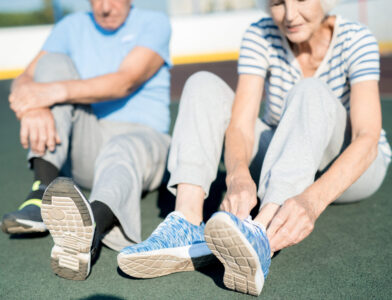 If you are on your feet all day for work or are planning a trip where you’ll do a lot of standing and walking each day, you need to have a shoe that can help your feet handle all this stress. We always preach the importance of finding a shoe that is suitable to the activities you’ll be performing, even if that’s just standing or walking for extended periods.
If you are on your feet all day for work or are planning a trip where you’ll do a lot of standing and walking each day, you need to have a shoe that can help your feet handle all this stress. We always preach the importance of finding a shoe that is suitable to the activities you’ll be performing, even if that’s just standing or walking for extended periods.
So while you can find tips for buying specific shoes like hiking boots, sandals or athletic cleats, we want to use today’s blog to share some tips for finding the right shoes if you’ll be doing a lot of standing and walking in the near future.
Shoes For People On Their Feet All Day
If you’re going to be on your feet for an extended period, there are certain things you’ll want to look for when buying a pair of shoes. Here’s what we recommend.
1. Comfort Over Style – You need to prioritize comfort over style when picking out a shoe that you’ll be wearing for 8-12 hours at a time. It won’t matter how awesome your shoes look if your feet are in pain because they are not adequately supported. Make sure that your feet feel comfortable inside the shoe before you buy. This is why it’s so important to try on shoes in a store before you buy them.
2. Consider Extra Cushioning – For added support, consider adding a pair of orthotic inserts. You can buy an over the counter option or you can connect with a foot specialist and have a custom pair created. All feet are different, so if you have high arches or shrinking fat pads on your heels, don’t overlook connecting with a specialist to have an orthotic insert created to the specifics of your foot.
3. Arch Support – Speaking of your arches, make sure that they are supported in any shoe you’re considering. If you’re going to be on your feet for extended periods and your arches aren’t adequately supportive, this can lead to fallen arches or more strain on your plantar fascia. Some shoes have higher arches or are designed for flat feet, so do your research and match your shoes to your feet.
4. Check The Width – Shoes that are too tight can end up causing problems for our toes. Bunions are the most common toe-related issued caused by narrow shoes, and you’ll want to make sure that you select a wide enough shoe because our feet tend to swell a bit throughout the day, especially if you’ll be on your feet for long periods. If your shoes are tight when you first put your feet in them, they’ll only feel tighter as the day goes on.
5. Good Grip – If you’ll be on your feet for an extended period of time, odds are you’ll encounter some surfaces that require a little extra grip. Grip is especially important for nurses or teachers who spend a lot of time walking on tile floors that can get slippery. Check the bottom of your shoes to ensure it has a healthy amount of grip.
Finally, once you’ve found the right pair of shoes, make sure that you break them in before you need to spend an extended period of time in them. New shoes can lead to sores or blisters, so gradually break in your shoes to reduce your likelihood of developing a wound as your feet get used to the new pair.